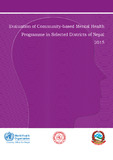Please use this identifier to cite or link to this item:
https://hdl.handle.net/20.500.14356/759| Title: | Evaluation of Community-based Mental Health Programme in Selected Districts of Nepal 2015 |
| Authors: | Dhimal, Meghnath Thapa, Pushpa Pandit, Arpana Khatiwada, Madhab Aryal, Krishna Kumar Regmi, Jaya Sharma, Chandrakala Dhakal, Purushotam Karki, Khem Bahadur |
| Citation: | Dhimal M, Thapa P, Pandit A, Khatiwada M, Aryal KK, Regmi J, Sharma C, Dhakal P, Karki KB.Evaluation of Community-based Mental Health Programme in selected Districts of Nepal, 2015. Kathmandu, Nepal: Nepal Health Research Council, 2016 |
| Issue Date: | 2016 |
| Publisher: | Nepal Health Research Council |
| Keywords: | Mental Health |
| Abstract: | Executive Summary Context of the evaluation: With the aid of the World Health Organization (WHO), Country Office for Nepal, a community-based mental health programme incorporating two components; mental health outreach camp and training of community health workers was commenced by the Mental Hospital in December, 2010 for a year. However, the programme with the goal of increasing accessibility of mental health services is still underway in Dhading and Nuwakot with own resources of the Mental Hospital. As the programme crosses its four years; necessity of evaluation does exist in order to have an insight into current status, achievement of objectives, and justify the significance of its presence to the relevant stakeholders. Therefore, evaluation was carried out independently by the Nepal Health Research Council (NHRC) to help to make a decision on the amendment and expansion of the programme; giving the figure of relevance, efficiency, effectiveness, sustainability, and impact. Methodology: Both qualitative and quantitative methods were employed. Study participants were Public Health Inspectors, trained health workers, including female community health volunteers (FCHVs), community leaders actively involved in the outreach camp, and clients of outreach camp. Qualitative information was assembled through key informant interview (KII) guideline and exit client interview guideline. Checklist was used for quantitative data. Quantitative information were cleaned, entered, and analyzed in the Statistical Package for Social Science full version 16.0. Thematic analysis was the process used for accumulated qualitative data. The study stood by ethical guidelines, with an ethical approval from an independent Ethical Review Board of NHRC and a written informed consent from the participants. |
| URI: | http://103.69.126.140:8080/handle/20.500.14356/759 |
| Appears in Collections: | NHRC Research Report |
Files in This Item:
| File | Description | Size | Format | |
|---|---|---|---|---|
| mental_health_setting.pdf | View Full Text Report. | 2.6 MB | Adobe PDF |  View/Open |
Items in DSpace are protected by copyright, with all rights reserved, unless otherwise indicated.
